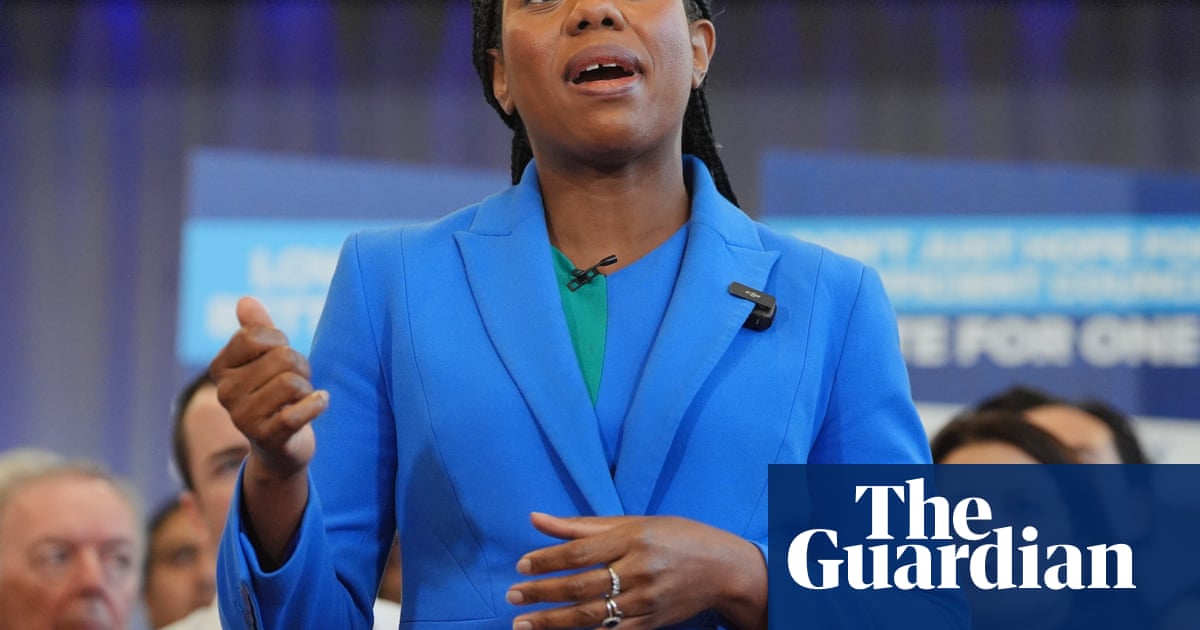The Conservative party is fighting to justify its existence amid concerns that its pipeline of future voters is “completely dead”, a former cabinet minister and leading thinktank director has said.
Simon Clarke, an ally of Boris Johnson who backedKemi Badenochfor the leadership last year, was among a string of former Tory ministers and serving MPs to tell the Guardian she faced removal by her party if she did not turn its fortunes around by next year’s local elections.
He said the party needed to face up to the reality that it had “not had a clear, compelling narrative for a long time”, and that it must focus on intergenerational fairness, public services reform and the economy.
His assessment came after a week of recriminations for the Conservatives over the local election results, with Badenochtelling activists she was sorryfor the loss of more than 600 councillors.
The 200-year-old party, which has traditionally vied only with Labour to lead the government, has recently slumped to about 17% in the polls, while Reform and the Lib Dems are increasing challengers to the two-party system.
Nigel Farage’s Reform UK took more than 600 seats, and control of 10 councils as well as two mayoralties in a bruising night for the two main parties. Data shows that about 57 of the Reform councillors elected had previously stood for theConservatives, and Tory MPs have reported losing many of their activists to Farage’s party, adding to its improved political organisation.
Speaking to the Guardian about whether the Conservative party can recover and renew while being squeezed by both Labour andReform UK, Clarke said he agreed with the former chancellor Jeremy Hunt that the party could not rule out becoming extinct.
“I think that we have to accept that we are fighting to justify our existence and there is no point sugarcoating that reality. We do in particular need to come up with a positive offer for younger people. My single biggest concern, among many, is that the pipeline of future Conservative voters is completely dead.”
The former communities secretary and senior Treasury minister, who now leads the thinktank Onward, said the Conservatives needed to “get into a better place on policy quite quickly” to avoid it being very hard to rebuild.
“We need to come up with a serious, fair market offer, which in turn will allow us to right-size the public finances and re-earn our traditional territory of being the most responsible, pro-market party that’s on offer to voters,” he said.
“That doesn’t happen overnight but that journey needs to begin right now because we saw last week [at the local elections] that if we don’t get into a better place on policy quite quickly then we are going to not just be wiped out nationally but locally, which will clearly make the route back very hard. The activists, the councillors you lose are very, very difficult to replace.”
Badenoch was right to say it would be premature to offer a definitive manifesto now for a May 2029 election, Clarke said, but no one would disagree with setting out “animating principles” to underpin that.
“At the moment, we are being defined by our opponents rather than our own actions and that does need to change,” he said.
Steve Baker, a Eurosceptic former cabinet minister who lost his seat last year, and strongly backs Badenoch, said: “Next year there are council elections bigger than the ones we just had and if Kemi hasn’t turned things around by those elections it seems most likely to me that Conservative MPs will move against her. The practical brute politics is that – I wish it were otherwise – if Kemi doesn’t start paving the way next year she is going to be in danger from supporters of Robert Jenrick moving against her.”
Baker said the Conservatives’ challenge was to deal with age-related problems in the economy and come up with a “clear idea of what the problems are that people face in their everyday life and work out how we answer those problems in a way that matters to normal voters ... We failed to answer the immigration question and have not adequately raised living standards.”
He added that the party needed to support cutting “the winter fuel allowance, get rid of the triple lock which multiplies our difficulties with unfunded pension liabilities, and we’ve got to stop the public sector accruing extremely generous public sector pensions”.
From the opposite wing of the Conservatives, Michael Heseltine, a former deputy prime minister and pro-European peer, said he believed the party would be able to recover but it needed to forge a better relationship with the EU and start making positive arguments about immigration as a force for good in the economy.
“There’s nothing unprecedented in this situation,” Lord Heseltine said. “The Conservatives have been in difficult places before and they’ve always woken up to realise that winning in parliamentary democracies demands an understanding of what needs to be done for the country … They need to understand what British self-interest is about and have the courage to articulate it.”
Earlier this week, Hunt, a former chancellor and health secretary, said the party could notrule out extinctionand it would take a while to bounce back from a “massive earthquake” that has seen the two-party system fracture. The former chancellor George Osborne also weighed in on the Conservative party’s fortunes on Wednesday, saying the party was making a mistake focusing on culture wars and trying to ape Reform. He told LBC: “If we spoke a little bit less about transgender toilets and a bit more about taxes, then we might be on to something.”
Additional reporting: Michael Goodier
